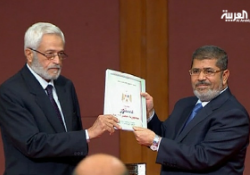
On November 22, 2012, President Mohammed Morsi of Egypt gave himself broad new powers related to the writing and ratification of Egypt’s constitution. The most controversial of these powers, which led to mass protests in Egypt, stated that “Morsi’s decisions could not be revoked by any authority, including the judiciary, until the new constitution had been ratified and a fresh parliamentary election is held.” Although Morsi said that those powers would last only until the new constitution is ratified, many Egyptians perceived this action as a power grab.
This added to the already controversial nature of the draft constitution, which “has been criticized for not protecting the rights of women and minority groups, and…restricting freedom of expression.” Another concern is that the charter apparently favors Islamists, both by giving clerics influence over legislation and by taking power away from other groups. The perceived enhancement of Islamist power has divided the country; the Islamists and Muslim Brotherhood (of which Morsi is a member) support the draft constitution, while youth groups, Coptic Christians, and other more liberal groups oppose it.
A referendum on the draft constitution is supposed to be held on December 15, and protesters have already demonstrated in opposition to the event taking place. Morsi stated that he still intends to hold the referendum in the wake of the protests. On December 6, Morsi offered to engage in a dialogue with opposition members, but many groups, including the prominent National Salvation Front, declined. Instead of being perceived as an attempt to negotiate, opposition parties saw the proposed dialogue as Morsi’s willful ignorance of the Egyptian people’s demands.
Morsi’s supreme powers evoke memories of Hosni Mubarak’s rule, and many of the protests against Morsi echo those from early 2011 when Mubarak’s regime fell. Like those protests, the recent demonstrations have also turned violent. Indeed, the protests represent “the first time supporters of rival camps have fought each other” since the protests against Mubarak. Although the violence alone is reminiscent of the Mubarak protests, the similarities run deeper than that. Nobel Peace Prize laureate Mohamed ElBaradei noted the danger “that Morsi’s rule was ‘no different’ than Mubarak’s…[and] ‘is perhaps even worse.’” ElBaradei particularly noted that Morsi’s supporters had violently attacked peaceful protesters near the presidential palace, and he called on Morsi to “[c]ancel the constitutional declarations, postpone the referendum, stop the bloodshed, and enter a direct dialogue with the national forces.”
Today, the protests face additional uncertainty. Morsi approved a decree authorizing the use of martial law in order to quell the demonstrations. This runs contrary to any proposed discussions between Morsi and liberal parties. Some changes have taken place during the past few chaotic days; among other things, Morsi “has sought to redefine his initial decree so it fits within judicial precedents instead of stepping over the courts…[and] has said that the decree would be canceled after the referendum…, even if the constitution is rejected.” Other government officials said they would permit additional constitutional amendments by opposing parties. However, the proposed martial law decree undermines the force of these apparent concessions.
Tanya Sevy is a 3L at the University of Denver Sturm College of Law and the Survey Editor of the Denver Journal of International Law and Policy.


